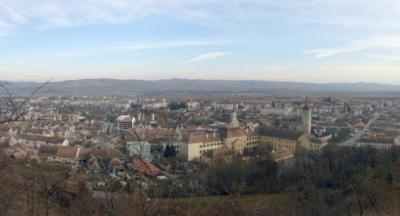Aiud
*Disclaimer: The information and views set out in this page do not necessarily reflect the official opinion of the Council of Europe and/or the European Commission. Neither the Council of Europe, the European Commission nor any person acting on their behalf may be held responsible for the use which may be made of the information contained therein.
The Municipality of Aiud is in the Transylvania region in the centre of Romania. It consists of Aiud city and ten villages. Previously an industrial city, the labour market shrank after the change of regime in 1989 which resulted in the closure of a metallurgic factory that employed over 10,000 workers. Consequently, the population suffered economically and a large number of the area’s youth emigrated.
According to the 2011 census, Roma are the third largest ethnic minority, representing around 4% of the total population. However, estimates from local non-governmental organisations believe the Roma population in Aiud is higher, at almost 10% of the general population. Roma communities are dispersed throughout the city in seven distinct places: Budu, Pasunii, Vale, Drum, Tiglariei, Bufa and Polygon. These communities are located on the outskirts of the city. Most of the Roma are unemployed, and receive social benefits.
The Roma are facing issues related to infrastructure (lack of sewage, gas and asphalting in several neighbourhoods); a lack of title documents for the buildings and lands for about 80% of Roma in Aiud; as well as risks of evictions for Roma living in social housing (houses that are being claimed by the previous owners). School drop-out is another issue with 30% of Roma children not completing their education. In terms of employment, only 30% of the working aged Roma are employed.
The Mayor of Aiud signed the Letter of Commitment to the ROMACT programme on the 7th February 2014. The priorities identified by the CAG, focusing mostly on short term development needs, were endorsed by the Local Council in May 2014 and are a part of the extended Municipality Development Plan.
Short term and long term priorities endorsed by the Aiud Local Authority concerning Roma issues are the following measures:
Education and employment
- A Multifunctional Centre for deliver training courses aimed to facilitate the integration of students in the labour market (including social entrepreneurship);
- After-school educational programs (+ canteen) to support children;
- Transport to and from the school and kindergarten for the Poligon and Bufa communities;
- Expansion of the Day Centre to accommodate more children in the after-school program
Infrastructure
- Repair and maintenance of main roads in 6 communities;
- Installation of waste management systems in Cetatii area and Dorului street;
- Installation of rain-water drainage system (e.g.: in Motilor street and Budu area) to protect households in high flood risk locations;
Housing
- Construction of new social housing;
- Support to access property documents and ID;
Health
- Family Doctor Registration;
- The organisation of hygiene campaign.
Some of these measures have already been implemented, actions implemented include: the construction of four social houses with the support of the local authorities; transportation to school for children from Bufa and Poligon; support in accessing ID and property documents for 37 households; the registration of all Roma to a family doctor; and financial support to the Day centre for monthly activities for Roma children.
ROMACT will also support the coaching of the municipality staff members to apply for EU funds in order implement further actions from the Action Plan.
The ROMACT Process
The ROMACT cycle in Aiud was closed in May 2016.
The participatory processes between the Local Authorities and the Community Action Group, as well as the implementation of the measures adopted in the Joint Action Plan, continue independently and are being closely monitored by the ROMACT National Support Team in Romania. For further information on the progress made in Aiud since the closure of the ROMACT cycle, please contact any member of the ROMACT National Support Team and/or Ms Cosmina Niculita who is the contact person within the local administration of Aiud for the ROMACT Programme.

